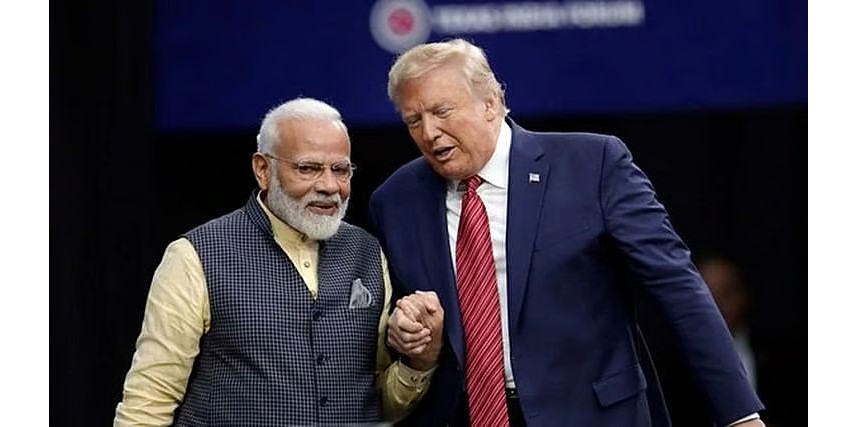India’s course must reflect its own strategic calculus and democratic priorities, not the turbulence of another country’s mood swings

When President Donald Trump announced that India would face a 25 per cent tariff from August, alongside a penalty for purchasing arms and energy from Russia, the declaration arrived wrapped in the language of friendship strained by what he called “unfair trade”. This is a show of power that India must neither accept nor bow before.
The choice of words —“fair-weather friend”— is no accident. It points to the price India is now asked to pay and the doubt that shadows any promise of friendship offered under conditions. In Washington’s telling, the bond holds only if India aligns its choices with American preferences, buys what it is told, and distances itself from long‑standing partners deemed inconvenient to the US.
For India, the lesson must be clear: a sovereign nation cannot barter critical choices — from who supplies its energy to how it shapes its digital future — simply to appease a partner that might turn tomorrow. India’s course must reflect its own strategic calculus and democratic priorities, not the turbulence of another country’s mood swings.
These tariffs will sting, of course. But they are far from an existential threat. Instead, they should serve as a wake‑up call to confront the structural challenges we have too often deferred. For years, we have delayed reforms that would give our industries greater internal agility, help manufacturing scale globally, and unlock more commercially enabling regulations.
These are the very changes that would bring true domestic self‑sufficiency and allow Indian products to command a premium abroad. A fair trade agreement must ultimately make Indian lives better, not worse.
History shows that nations modernising under pressure, but on their own terms, emerge stronger. The months ahead will test India’s resolve to blend openness with sovereignty and the ability to reform, including administrative ones. At home, India must act on what external pressure cannot force. We must liberate the economy from bureaucratic inertia and reform on a war footing. Regulations should be transparent, rational, and applied fairly, not form a maze that deters entrepreneurs and investors.
India has rightly resisted American demands to open its agricultural and dairy markets, arguing that such concessions would imperil the livelihoods of millions of small farmers. For decades, New Delhi has chosen to shield these sectors from trade pacts, not out of protectionism alone, but from a conviction that food security and rural stability are pillars of national interest.
A sense that New Delhi gave way on agriculture or dairy could provoke a backlash, not just from the opposition but within the ruling coalition, where rural livelihoods remain central. In India’s democracy, the political price of appearing to trade away hard-won independence could far outweigh any short-term economic gain.
India must also hold the line on sectors where national interest is non-negotiable. Agriculture and dairy are not mere economic variables; they are tied to rural livelihoods, social stability, and food security. Conceding on these under duress would sacrifice millions at the altar of a fleeting trade peace.
Beyond trade numbers, there is a strategic contest unfolding in technology, data, and emerging industries. Washington’s real objective may well be to keep India’s digital infrastructure and critical supply chains tethered to American platforms and intellectual property. In areas like emerging and disruptive technologies, possibly the geopolitical supremacy tools of this century — semiconductors, cybersecurity, and AI — the United States would naturally prefer India as a downstream partner rather than an autonomous peer.
Accepting this as the hidden price of a trade détente would be a grave strategic mistake. India must instead use this moment to invest in indigenous capability, enforce full data localisation, and shape standards that reflect its own sovereign interests.
India must also stand firm in defending its digital and data moats, even if doing so hits at entrenched Big-Tech hegemonies and India’s own painful dependencies currently. Today, vast swathes of India’s digital economy run atop US-owned cloud infrastructure, rely on American app ecosystems, and depend on digital advertising platforms, whose algorithms are built and governed elsewhere.
India’s response will be watched far beyond Delhi and Washington. Middle powers across Asia, Africa, and Latin America are observing whether a large democracy can hold its ground against superpower pressure without retreating on sovereignty.
Tariffs and penalties linked to India’s purchase of Russian energy raise a larger question too. No single partner should hold a veto over our energy basket. Strategic autonomy in this century demands that India diversify its energy sources, from West Asian oil and Russian supplies to domestic renewables. That alone can ensure no external crisis or bilateral dispute jeopardises our energy security.
In a move that exposes the wily currents of ‘great‑power’ geopolitics, Trump, only hours later, announced a fresh energy deal with Pakistan to jointly tap its oil reserves—and even hinted that Pakistan might one day export oil to India.
Above all, India cannot remain pliant in friendship with the United States while ignoring its longstanding ties with Russia. True strategic autonomy means preserving old partnerships even as we build new ones and never allowing anyone to dictate whom we may engage.
Sovereignty in trade does not mean turning inward or rejecting global commerce. India’s challenge is to integrate deeply into global value chains while building domestic capabilities and protecting vital sectors. Ultimately, sovereignty in trade is not an abstract doctrine. It is the right of over a billion citizens, through democratic institutions, to decide the nation’s economic destiny. A deal signed under pressure or framed by external red lines would betray that democratic mandate.
Indian negotiators note that these tariffs may be temporary, with talks progressing towards a deal by autumn. If Washington truly seeks partnership, it must understand that India’s resilience is born not of isolationism. True friends respect sovereignty; true leaders reform from conviction, not fear.
-- FPJ